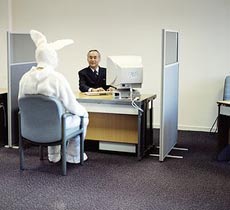-
(单词翻译:双击或拖选)
Part 1 Resume Writing 简历写作
Developing a Resumé is the first step in any successful job search. The average Resu mé is written out of necessity. Everyone knows you have to have one to get a job.
mé is written out of necessity. Everyone knows you have to have one to get a job.
Your resume is like your personal movie trailer. You want your resume to capture your employer's interest, so they'll want to learn more about you.
An effective resume will quickly highlight who you are, where you can be reached, and information about your most recent educational or training experiences. To make writing your resume as painless as possible, assemble the following information before you begin:
·Personal information such as name, address, phone, and e-mail address
·Current job objective
·Education and training
·Work experience, including duties and dates of employment
·Accomplishments (particularly as they relate to work experience)
·Specific skills and abilities
·Information about software knowledge or machinery1 you can operate
·References if possible.
Writing a resume applies some strict rules. You should Be clear and concise2, 1-2 pages should be the maximum. Be honest about your experience and goals (but present them in the best possible light). Stress what you can do and what you've learned. Be neat---no typos, smudges, etc. Don't forget to include volunteer work, work and school awards and honors, notable skills---that your employers are interested in all of these. Make the most of your experience. Be proud of what you've done in the past. This helps make a positive impression.
Last but not least, do remember to proofread3 it! We can't over-emphasize the need to proofread your resume--and better yet, have someone else proofread it for you, Give them to your English teacher or guidance counselor4 and have them look it over. Two sets of eyes are better than one--your proofreader may catch mistakes that you missed, but an employer won't miss. Resumes with grammar mistakes, misspellings or uneven5 margins6 often get tossed.
对许多人来讲,一份简约明快的英文简历是进入外企的“敲门砖”。那么,如何写好英文简历呢?
首先,语言简练。对于求职者来讲,目的明确、语言简练是简历行之有效的基础。 如在教育背景中写相关课程,不要为了拼凑篇幅,把所有的课程一股脑儿地都写上,如体育等。这样不很有效,别人也没耐心看。
其次,个人资料部分包括求职者的姓名、性别、出生年月等,与中文简历大体一致。第二部分为教育背景(EDUCATION),必须注意的是在英文简历中,求职者受教育的时间排列顺序与中文简历中的时间排列顺序正好相反,也就是说,是从求职者的最高教育层次(学历)写起,至于低至何时,则无一定之规,可根据个人实际情况安排。
第三, 社会工作。在时间排列顺序上亦遵循由后至前这一规则,即从当前的工作岗位写起,直至求职者的第一个工作岗位为止。求职者要将所服务单位的名称,自身的职位、技能写清楚。把社会工作细节放在工作经历中,这样会填补工作经验少的缺陷,例如,你在做团支书、学生会主席等社会工作时组织过什么活动,联系过什么事,参与过什么都可以一一罗列。而作为大学生,雇主通常并不指望你在暑期工作期间会有什么惊天动地的成就。当然如果你有就更好了。
社会工作。在时间排列顺序上亦遵循由后至前这一规则,即从当前的工作岗位写起,直至求职者的第一个工作岗位为止。求职者要将所服务单位的名称,自身的职位、技能写清楚。把社会工作细节放在工作经历中,这样会填补工作经验少的缺陷,例如,你在做团支书、学生会主席等社会工作时组织过什么活动,联系过什么事,参与过什么都可以一一罗列。而作为大学生,雇主通常并不指望你在暑期工作期间会有什么惊天动地的成就。当然如果你有就更好了。
第四,所获奖励和作品(PRICE&PUBICATION)。将自己所获奖项及所发表过的作品列举一二,可以从另一方面证实自己的工作能力和取得的成绩。书写上奖学金一项一行。
另外,大多数外企对英语(或其他语种)及计算机水平都有一定的要求,个人的语言水平、程度可在此单列说明。
Part 2 Cover Letter Writing 求职信写作
A cover letter is a short business letter that accompanies your resume and serves as an introduction to it. It's a chance to customize your particular qualifications and experience for a specific job opening or prospective7 employer.
Writing a cover letter can be a daunting8 task. These tips should help make it a little easier:
·Direct your letter to the decision-maker of the organization.
·Write a short, concise letter (2-3 paragraphs at most).
·Type the letter and envelope.
·Sign your name.
·Use standard English.
·Double-check your spelling and grammar.
·Use standard white paper.
·Keep a copy of everything you send to each organization.
·Follow up with a phone call after three business days.
Besides, there are several Cover Letter Dos and Don'ts you should keep in mind.
Dos:
·Include the person's full name, title, company name, and company address.
·Include your full name, address, and contact information.
·Use a formal greeting, such as Mr., Ms., Dr.
·Center your margins.
·Follow up after three business days.
·Mention how you found out about the position.
·Be upbeat and creative--make your letter stand out.
·Keep copies of everything you send.
Don'ts:
·Don't write a long letter--shorter is better.
·Don't address the person by first name unless you know him or her personally and have permission to do so.
·Don't forget to personally sign the letter.
·Don't forget to check grammar and spelling.
·Don't use flashy stationery9 (unless you're applying for a highly creative job).
·Don't use slang.
不容置疑,一封高质量的英文求职信是帮助你应聘成功的敲门砖。如果你自己是一件商品的话,那么你的英文求职信,就是一封把你自己推销出去的一种商业信函。通过求职信让你的雇主在最短的时间内对你的教育背景,能力,业绩,愿望等等,有一个深刻的印象;在众多的求职者中脱颖而出,从而一举获得成功,得到你梦寐以求的职位!
Part 3 Before the Interview 面试准备
There are few experiences filled with more anxiety and trepidation10 than a job interview. Thoughts such as "What if I don't get any job offers?," "What if I don't get the job I want?," or "Will I accept a position that isn't right fo r me?" can cause considerable upset. Here are a few notes and pointers on how to prepare for interviews and determine if this job is the right one for you.
r me?" can cause considerable upset. Here are a few notes and pointers on how to prepare for interviews and determine if this job is the right one for you.
The key to reducing your anxiety is in being well-prepared for the interview. The first step towards a successful job interview is self-assessment. You need to decide for yourself what kind of position you want. Since self-knowledge is the foundation of all decisions, a close scrutiny11 of your priorities, interests, short and long-term goals is necessary before any interview.
Remember: if you're unsure of whether or not you want the position you're interviewing for, it will probably show. If you don't have a reasonably clear focus, this is the time to do some hard thinking about what kind of position you want.
The second step in preparation for your interviews is to research the companies you'll be interviewing with. You should know as much about the company and the position as you possibly can. As you do your research, look for points where your interests, capabilities12, goals, and personality match the company's needs or whatever needs you think they might have.
Every interviewer, whether directly or indirectly13, will expect you to be able to answer questions like: Why do you want a position in this company? What can you do for my company? There are a few of the more popular interview questions. Take some time to think about the answers, and you'll be much more prepared to make a great impression. At a job interview, your employers will probably ask the following:
·What jobs have you liked the most? The least?
·Can you tell me about your present job?
·What do you expect to be doing five years from now?
·Why do you want to work for our company?
·What are your strengths? Your weaknesses?
·What do you know about our company?
·Can you give me a reason to hire you?
·What was your best subject in school? Your worst?
·What makes you qualified14 for this job?
·Can you tell me about the best day you've ever spent on a job? Your worst?
·How do you define success?
·Ar e you able to travel? Relocate?
e you able to travel? Relocate?
·Can you tell me about your skills?
·Are you able to use a computer?
·Can you describe your ideal supervisor15?
·Why did you apply for this job?
·How do you use this specific computer application to solve a job-related program?
·Do you have any samples of your work? (This is where that portfolio16 comes in handy!)
And you're supposed to dress properly. A suit, dress shirt and tie are usually required for men. Women should wear either a suit or a dress with a complementary jacket. They are ALWAYS acceptable.
Those men with more limited wardrobes should wear a nice sports coat with coordinated17 slacks and shirt. Women should wear a nice jacket with coordinated skirt or slacks.You should always avoid wearing sneakers to interviews.
Part 4 The Keys to Winning Answers 巧妙应答
Nothing can replace time spent studying possible interview questions and thinking about your answers. But the re are a few key principles to winning answers, even for questions you're not prepared for. We've outlined these principles here, and even provided possible answers to some of the toughest questions an interviewer can wing at you.
re are a few key principles to winning answers, even for questions you're not prepared for. We've outlined these principles here, and even provided possible answers to some of the toughest questions an interviewer can wing at you.
The Keys Are:
·Think about the questions you might be asked before the interview and how you could best respond. You can refer to our list of frequently asked interview questions above.
·Listen carefully to the interviewer's questions.
·Take time to collect your thoughts before answering.
·Keep your answers short and to the point.
The following are the Answer Suggestions for Tough Questions:
The first question is : What can I do for you?
Employers really don't want a straight answer to this question. They know you want a job. Suggested responses, therefore, should tell employers they gain something by employing you. Answers such as "Actually, I'm here to offer you something--loyal and efficient work" or "I think the question is what I can do for you. I'm here to talk about your needs for an expert driver" are good.
Second question: Why don't you tell me something about yourself?
Be prepared to talk about your unique qualities. Wind up with something that relates to the job. An example: "I'm a native of Jones County, raised here and educated at Jones Community College. I have a large number of friends who are loyal to me because I get along with almost any type of person. I've met many of my friends while working as a volunteer in the Habitat for Humanity effort in my community, and my experiences there are among the reasons I'd be an excellent construction worker for your company, Mr. (or Ms.) Builder."
The third one is : What kind of work are you looking for?
Be as specific as you can with this particular employer. The best answer to this question will be found in the job description you obtained pri or to the nterview. You can repeat the duties listed for the position for which you're interviewing. Other answers that suggest you want to grow and learn or want to demonstrate your good work ethic18 would be "I want a job in which I'll be able to produce for the company and grow along with it" or "I want a job where showing up on time and working hard is compensated19 by a fair wage."
or to the nterview. You can repeat the duties listed for the position for which you're interviewing. Other answers that suggest you want to grow and learn or want to demonstrate your good work ethic18 would be "I want a job in which I'll be able to produce for the company and grow along with it" or "I want a job where showing up on time and working hard is compensated19 by a fair wage."
The last one is : What do you do best?
This question demands that you praise yourself--something a lot of us are uncomfortable doing. As you prepare for the interview, think through some of your recent successes you can use to give a good answer to this question. It's best if they relate to ways you improved the current business, generated new business, or saved money for the company.
Part 5 Questions to Ask in a Job Interview 向面试考官发问
Of course, after all the questions interviewers asked you, you get to ask some as well. In fact, they expect it, so having a few questions ready is a good idea. We've assembled some of the questions job applicants21 ask most often.
About the Job 
·Can you describe an ideal employee?
·Can you tell me about the competencies necessary to perform this job?
·How is performance measured and reviewed?
·Can you describe a typical day in this job?
·Can you portray22 the best and worst aspects of this job?
·How long do people usually stay in this job?
·Why did the last person leave this job?
About the Department
·How many employees are in this department?
·How important does upper management consider the functions of this department?
·Are there any weaknesses in the department you're working on improving?
·Will I be able to meet the immediate23 supervisor for this role?
About the Company
·Does the company have a generalist or specialist focus?
·Could you explain your organizational structure to me?
·Where does this position fit in the organization?
·How long have you been with the company?
·Why do people leave?
·What are the company's strengths and weaknesses as compared to the competition?
·Who are your major competitors?
·What are the best opportunities in your company for new hires?
About the Future
·What pending24 legislation could impact the company?
·What is the vision of the company?
·What are the major changes in the industry, and how is the company responding?
Part 6 Make A Great First Impression 建立良好的第一印象
On ce you get in front of a person who has the power to hire you, it is important to make him or her feel good about you. After all, there is a lot at stake for employers in the interview process. Their reputation is on the line, too. If they hire someone who winds up being totally incompetent25 or otherwise lackluster, it will be to their discredit26. So, the first thing to do is to concentrate on making a good first impression. During the first 15 seconds of an interview, an employer will perceive you in two ways, one visual and the other tactile27. You guessed it: Your appearance and your handshake go a long way toward making a good impression.
ce you get in front of a person who has the power to hire you, it is important to make him or her feel good about you. After all, there is a lot at stake for employers in the interview process. Their reputation is on the line, too. If they hire someone who winds up being totally incompetent25 or otherwise lackluster, it will be to their discredit26. So, the first thing to do is to concentrate on making a good first impression. During the first 15 seconds of an interview, an employer will perceive you in two ways, one visual and the other tactile27. You guessed it: Your appearance and your handshake go a long way toward making a good impression.
To make the right first impression and sell yourself in an interview, you must prepare, start at the beginning, and never skip steps. Let's begin, using the job interview as an example. The first thing to do is to know your interviewer. Begin researching a company when you begin requesting interviews.
Use a company's Web site, information from network contacts, or a library to get to know your interviewer. Understand what that company does, and try to get to know its culture, or personality. Any information, however trivial, may be used to your advantage during the interview.
Dress properly to sell yourself. Your "interview suit" should be appropriate for the company and industry, and you should prepare to dress to sell well in advance of your interviews. If you aren't sure how "dressy" or how "casual" would be acceptable, go to the company and observe the employees, or simply just ask. It's perfectly28 acceptable for you to ask the person who arranges your interview about dress codes. It shows that you want to make the right impression. Remember that less is best with makeup29, jewelry30, and cologne, and the interview is not the place for to make fashion statements. It's better to be remembered as a totally prepared and professional applicant20 than "the one with the fuchsia? tie." If you need help in choosing interview clothing, visit a couple of established clothing stores and get opinions from professional clothing salespeople31. You don't have to spend a fortune on suitable interview outfits32, but you should plan ahead and get comfortable with your new clothes before the interview.
You can use a pocket calendar. Keep accurate records. Record the date and time of each interview and take your calendar to your interviews, along with a few extra copies of your resume, copies of your references, a note pad, and a pen that works. As soon as your interview is over, record when you intend to follow up, or the date of a second interview.
Know where your interview will take place, how to get there, and where to park. A dry run before the interview is a good idea. Arrive ten minutes early. Never be barely on time for an interview. Walk into the office ten minutes early. You will probably have to complete an employment application, so allow time. Good first impressions don't start by being late.
Don't fidget. If asked to wait for your interviewer, do so patiently. Don't chew gum, smoke, or accept a soft drink or coffee. Sit quietly and mentally rehearse your interview agenda.
Remember to smile, shake hands firmly and make sincere eye contact. When you are called for your interview, greet your interviewer with a smile and a firm handshake. Allow yourself to be directed to his office and wait to be offered a seat. Keep your posture33 erect34 without being stiff, and sit with your legs uncrossed. Be comfortable, but don't slump35 down in your seat, don't accept refreshments36, and do not touch anything on the interviewer's desk.
Be observant. During the "small talk," look around the office. Are there trophies37 or pictures that suggest your interviewer's interest in sports? Are there family pictures and photo opts38 with prominent people? Be observant without being obvious-you never know when something you observe may be able to be used productively during the interview.
You're supposed to control your interview. The "small talk" will be limited and your interviewer will begin. You should know why you are there and what you have to offer. Your agenda is to sell your strengths and get hired, so you must be alert to opportunities to get your points made. You must concentrate on what your interviewer is saying and the kinds of questions being asked.
Listen and hear everything, and respond accurately39 and briefly40 to each question. The interviewer is leading, but you can control the direction of an interview by having a prepared agenda and concentrating on opportunities to slide your selling points into the conversation.
Do listen and hear. If you're asked if it's raining, don't describe the dark clouds. Listen to the question and address the question. Interviewers don't like to hear evasive answers. If you don't know the answer to a question, say so, and tell your interviewer you will get the information for them in the next day or two. 
Have questions prepared. You will probably be asked if you have any questions. If you prepared well, you should have some questions ready, like who your supervisor would be if you're hired, where your work station would be, would there be regular performance reviews, and what would be the next promotion41 level.
Never leave an interview empty-handed. When your interview ends, make sure you know your interviewer's name, title, and mailing address, and ask what happens next. Will there be a second interview, and if so, who will be conducting it and when will it take place? Do you have a hiring timetable? Would it be all right to follow up in a few days? Is there any more information that would help you make a favorable decision?
If you want this job and feel you are a good match, say so. Let your interviewer know you're ready to accept and exactly when you would be available to report to work. Be assertive42 without being obnoxious43. Close your sale.
Post interview notes. As soon as you get to your car, or home, make notes about what went well and not so well during your interview, and make sure you record any follow up or second interview in your pocket calendar. You can't follow up if you don't follow through!
Mail or hand deliver your thank-you note within 24-hours of your interview-this is a must! A hand-written thank-you note on plain paper is fine. Make it brief and courteous44. Thank your interviewer for the time and interest, and if you want the job, say so again. Then make plans to follow up on your interview, and continue your job search activity. Your sale is never completed until a start date has been offered.
 收听单词发音
收听单词发音
1
machinery

|
|
| n.(总称)机械,机器;机构 | |
参考例句: |
|
|
|
2
concise

|
|
| adj.简洁的,简明的 | |
参考例句: |
|
|
|
3
proofread

|
|
| vt.校正,校对 | |
参考例句: |
|
|
|
4
counselor

|
|
| n.顾问,法律顾问 | |
参考例句: |
|
|
|
5
uneven

|
|
| adj.不平坦的,不规则的,不均匀的 | |
参考例句: |
|
|
|
6
margins

|
|
| 边( margin的名词复数 ); 利润; 页边空白; 差数 | |
参考例句: |
|
|
|
7
prospective

|
|
| adj.预期的,未来的,前瞻性的 | |
参考例句: |
|
|
|
8
daunting

|
|
| adj.使人畏缩的 | |
参考例句: |
|
|
|
9
stationery

|
|
| n.文具;(配套的)信笺信封 | |
参考例句: |
|
|
|
10
trepidation

|
|
| n.惊恐,惶恐 | |
参考例句: |
|
|
|
11
scrutiny

|
|
| n.详细检查,仔细观察 | |
参考例句: |
|
|
|
12
capabilities

|
|
| n.能力( capability的名词复数 );可能;容量;[复数]潜在能力 | |
参考例句: |
|
|
|
13
indirectly

|
|
| adv.间接地,不直接了当地 | |
参考例句: |
|
|
|
14
qualified

|
|
| adj.合格的,有资格的,胜任的,有限制的 | |
参考例句: |
|
|
|
15
supervisor

|
|
| n.监督人,管理人,检查员,督学,主管,导师 | |
参考例句: |
|
|
|
16
portfolio

|
|
| n.公事包;文件夹;大臣及部长职位 | |
参考例句: |
|
|
|
17
coordinated

|
|
| adj.协调的 | |
参考例句: |
|
|
|
18
ethic

|
|
| n.道德标准,行为准则 | |
参考例句: |
|
|
|
19
compensated

|
|
| 补偿,报酬( compensate的过去式和过去分词 ); 给(某人)赔偿(或赔款) | |
参考例句: |
|
|
|
20
applicant

|
|
| n.申请人,求职者,请求者 | |
参考例句: |
|
|
|
21
applicants

|
|
| 申请人,求职人( applicant的名词复数 ) | |
参考例句: |
|
|
|
22
portray

|
|
| v.描写,描述;画(人物、景象等) | |
参考例句: |
|
|
|
23
immediate

|
|
| adj.立即的;直接的,最接近的;紧靠的 | |
参考例句: |
|
|
|
24
pending

|
|
| prep.直到,等待…期间;adj.待定的;迫近的 | |
参考例句: |
|
|
|
25
incompetent

|
|
| adj.无能力的,不能胜任的 | |
参考例句: |
|
|
|
26
discredit

|
|
| vt.使不可置信;n.丧失信义;不信,怀疑 | |
参考例句: |
|
|
|
27
tactile

|
|
| adj.触觉的,有触觉的,能触知的 | |
参考例句: |
|
|
|
28
perfectly

|
|
| adv.完美地,无可非议地,彻底地 | |
参考例句: |
|
|
|
29
makeup

|
|
| n.组织;性格;化装品 | |
参考例句: |
|
|
|
30
jewelry

|
|
| n.(jewllery)(总称)珠宝 | |
参考例句: |
|
|
|
31
salespeople

|
|
| n.售货员,店员;售货员( salesperson的名词复数 ) | |
参考例句: |
|
|
|
32
outfits

|
|
| n.全套装备( outfit的名词复数 );一套服装;集体;组织v.装备,配置设备,供给服装( outfit的第三人称单数 ) | |
参考例句: |
|
|
|
33
posture

|
|
| n.姿势,姿态,心态,态度;v.作出某种姿势 | |
参考例句: |
|
|
|
34
erect

|
|
| n./v.树立,建立,使竖立;adj.直立的,垂直的 | |
参考例句: |
|
|
|
35
slump

|
|
| n.暴跌,意气消沉,(土地)下沉;vi.猛然掉落,坍塌,大幅度下跌 | |
参考例句: |
|
|
|
36
refreshments

|
|
| n.点心,便餐;(会议后的)简单茶点招 待 | |
参考例句: |
|
|
|
37
trophies

|
|
| n.(为竞赛获胜者颁发的)奖品( trophy的名词复数 );奖杯;(尤指狩猎或战争中获得的)纪念品;(用于比赛或赛跑名称)奖 | |
参考例句: |
|
|
|
38
opts

|
|
| v.选择,挑选( opt的第三人称单数 ) | |
参考例句: |
|
|
|
39
accurately

|
|
| adv.准确地,精确地 | |
参考例句: |
|
|
|
40
briefly

|
|
| adv.简单地,简短地 | |
参考例句: |
|
|
|
41
promotion

|
|
| n.提升,晋级;促销,宣传 | |
参考例句: |
|
|
|
42
assertive

|
|
| adj.果断的,自信的,有冲劲的 | |
参考例句: |
|
|
|
43
obnoxious

|
|
| adj.极恼人的,讨人厌的,可憎的 | |
参考例句: |
|
|
|
44
courteous

|
|
| adj.彬彬有礼的,客气的 | |
参考例句: |
|
|
|

















